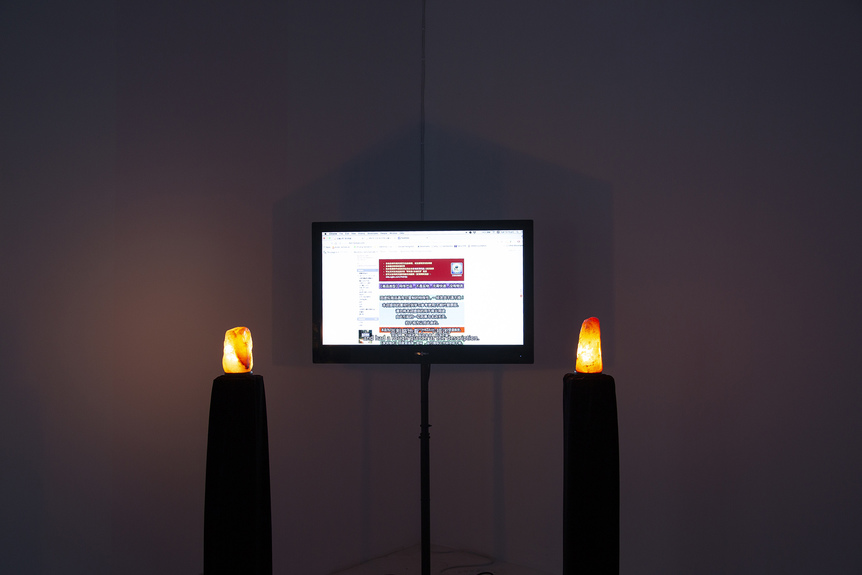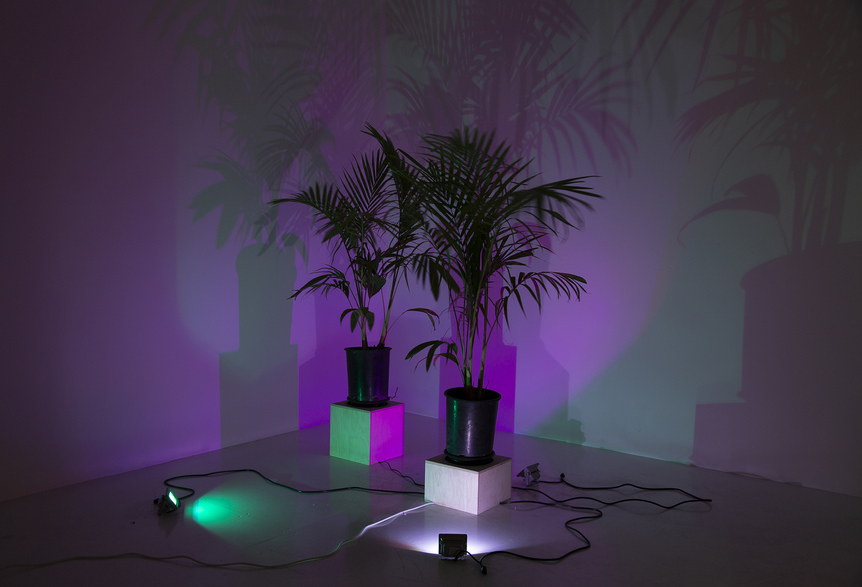-
From Current Issue
-
- Editor’s Letter Fire in the Heart
- Reviews I Gusti Ayu Kadek Murniasih
- Reviews 11th Seoul Mediacity Biennale: “One Escape at a Time”
- Dispatch Networked China
- One on One Monira Al Qadiri on Yukio Mishima
- Essays The rise of independent art spaces in pandemic-era Shanghai
- Features Tuan Andrew Nguyen
- Table of Contents
- Web Exclusives
- Archive
- Subscribe

R
E
V N
E
X
T
Installation view of KO SIN TUNG’s The Screen Conversation, 2018, single-channel color video with wallpaper, dimensions variable, at “Beckoning the Mutation,” Club Pro Los Angeles, 2018. All images courtesy the artist and Club Pro Los Angeles.
How does one negotiate space when it is as scarce a commodity as it is in Hong Kong, the fourth most densely populated place in the world? Cramped, 12-meter-square micro-apartments are an unreachable luxury even for some in the middle class, and the truly indigent live in what are known as “cage homes”—quarters not much larger than coffins. Artist and curator Dylan DeRose, who resided in Hong Kong from 2013 to 2016 but who is now based in Los Angeles, invited four Hong Kong artists to address the issue of space in a show at Club Pro gallery in Los Angeles.
Mak Ying Tung 2’s droll video, Out of Body Experience (2018), transported the artist’s whimsical, humorous spirit to the gallery while addressing space and monetary concerns. “Mak will have a group show in Los Angeles soon,” the caption states, “But she cannot afford the flight ticket.” Through a video recording of her computer screen, we see her purchasing an “out-of-body experience” on Taobao, the world’s most extensive e-commerce site, for the bargain price of five US dollars, so that she may be present at the opening of the show. The screen is flanked by columns topped with Himalayan salt lamps, believed by some to be able to cleanse the energy in a room, imparting a pseudo-religiousness to the work. In another video, The Screen Conversation (2018) by Ko Sin Tung, text taken from Samsung’s recent promotional material lauding the quality of their latest color displays runs continuously on the otherwise blank, black screen of a small cube television. Divorced from its commercial context (a reference that the visitor would not be privy to unless they spoke to the curator or gallery staff), the verbiage is oddly philosophical: “They are not only much brighter but are capable of expressing color in a way that’s incredibly fine and dense . . . Perfect black reveals perfect nature.” In a strange inversion, the void of the incongruently out-of-date television screen claims to contain infinitesimal possibilities. Displayed behind the monitor as part of the same work was wallpaper featuring abstract patterns, based on the distortions of the Samsung screens, while three manipulated prints drawn from the footage used as color-display demonstrations were on a perpendicular wall. The metaphysical reach of these works span far beyond their initially perceived limitations. According to marketing research firm Nielsen’s 2016 Year End Report, 91 percent of Hong Kong citizens accessed the Internet daily, while 92 percent of the population watched television everyday. Ko’s work refers to the world at one’s fingertips, made available through a screen within the confines of a cage or miniscule apartment.
Trevor Yeung’s Night Mushroom Colon (Six) (2018) underscores the deep entrenchment of electronics in urban daily life—indeed, every single work in the show fundamentally relies on electricity to operate or otherwise be viewed. Mimicking nightlights and conjuring the vulnerability of our private nighttime rituals, the artist is also attempting to create an emblem for the loneliness unique to dense metropolises. Frenzied outgrowths of colorful, lit-up plastic mushroom caps spore upon a labyrinthine cluster of adaptors plugged into an outlet low to the ground, as if this were wild ancient fungi encountered in a future primeval forest of the electronic age. Andrew Luk’s Horizon Scan No. 10 and No. 11 (both 2018) similarly envisage a futuristic, primordial topology by way of napalm-burnt canvases and the eerie glow of changing LED lights.
The human body is completely absent from this show—assiduously excised almost—but humanity is nevertheless palpable. Yeung’s Initial Ritual of Mr. Butterflies (2015) anthropomorphizes two butterfly palms. The pair of potted plants, set on electronic spinners, slowly rotate with anticipation until their fronds brush up against each other, as if coyly flirting at a crowded party.
The title of the show, “Beckoning the Mutation,” hints at the premise that cities and spaces can be caught in biological evolutions of a sort. Perhaps an advantageous adaptation for natural selection may be to cultivate one’s spiritual presence without taking up more physical space than is necessary, available or affordable.
“Beckoning the Mutation” is on view at Club Pro Los Angeles until July 29, 2018.
To read more of ArtAsiaPacific’s articles, visit our Digital Library.






